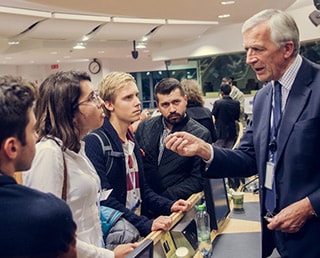Championing Agriculture for a New Generation

How do we feed a hungry world? With almost 10 billion mouths to feed by 2050 and production threatened by declining resources, global food security faces an immense challenge – but it can be addressed. This is exactly what delegates at the recent Youth Ag-Summit set out to do, ‘three little things’ at a time.
Running from October 9th to 13th in Brussels, Belgium, the summit brought together 100 of the world’s brightest young minds from 49 countries to find sustainable solutions for food security. Organized by Bayer and two Belgian youth farming associations, Groene Kring and Fédération des Jeunes Agriculteurs, the biennial Summit aims to empower youth leaders age 18-25 to advocate for three pillars for modern agriculture: sustainability, innovation and leadership. The final delegates had been selected from almost 1,200 applicants, based on their passion and original ideas in essays written about food security.
With their rallying call of ending poverty, protecting the planet and ensuring global peace and prosperity, the UN Sustainable Development Goals (SDGs) formed the basis of discussions, all under the umbrella theme of Zero Hunger (SDG 2). Delegates identified their most relevant SDGs in supporting food security, ranging from Gender Equality (SDG 5) to Climate Action (SDG 13) to Responsible Production and Consumption (SDG 12). Assigned to groups of ten to develop project ideas tackling these SDGs, the groups discovered that following a pitch process, three of these ‘Thrive for Change’ projects would be selected for further funding from Bayer.
Ready, set – innovate!
 The summit was intense from day one, with master of ceremonies and celebrity mathematician Simon Pampena encouraging delegates to consider the week as an “Olympics of Change.” In his opening address, Liam Condon, President of the Crop Science division of Bayer, urged the youth delegates to focus on “real problems in real areas,” stressing that there would be no simple solution. “Long-term change,” Condon said, “will have to be built from the ground up.” An array of international experts took to the stage throughout the week, with backgrounds ranging from grassroots activism, research and development, government policy and financial backing. Whether hearing from Professor Louise O. Fresco, President of Wageningen University & Research, on the future of food, or Global Citizen’s Hugh Evans on how to get global leaders onside, delegates took notes on how to make a difference from those who had already done it. This year’s speakers also guided the participants on the best ways of working together. As Caleb Harper from world-renowned Massachusetts Institute of Technology (MIT) put it, “If you have a big problem you’re trying to solve, you need a lot of people to try to solve it.”
The summit was intense from day one, with master of ceremonies and celebrity mathematician Simon Pampena encouraging delegates to consider the week as an “Olympics of Change.” In his opening address, Liam Condon, President of the Crop Science division of Bayer, urged the youth delegates to focus on “real problems in real areas,” stressing that there would be no simple solution. “Long-term change,” Condon said, “will have to be built from the ground up.” An array of international experts took to the stage throughout the week, with backgrounds ranging from grassroots activism, research and development, government policy and financial backing. Whether hearing from Professor Louise O. Fresco, President of Wageningen University & Research, on the future of food, or Global Citizen’s Hugh Evans on how to get global leaders onside, delegates took notes on how to make a difference from those who had already done it. This year’s speakers also guided the participants on the best ways of working together. As Caleb Harper from world-renowned Massachusetts Institute of Technology (MIT) put it, “If you have a big problem you’re trying to solve, you need a lot of people to try to solve it.”

With this in mind, delegates were asked to commit to doing ‘Three Little Things’ to positively impact food security in their own communities, whether it was immediate actions like joining ag conversations on Twitter or long-term plans such as starting grassroots outreach in schools. These small actions are the first step in winning over a wider population, as Australian delegate Sam Coggins points out: “To engage more people in agriculture, we need to talk about common values. Instead of saying ‘I love soil,’ say ‘I care about kids going hungry every day.’ When you talk about agriculture as a mechanism for contributing to things you believe in, other people start to pay attention.”
Up-close and live
 The summit’s youth delegates also made use of their time in Brussels by visiting the EU Committee of the Regions. There, the delegates had the chance to debate the future of agricultural policy with members of the European Parliament, touching on topics as varied as Brexit, global trade, new breeding methods and farming subsidies. Delegates even heard from the EU Commissioner for Agriculture and Rural Development Phil Hogan, who sent a personalized video message welcoming the delegates to Brussels and highlighted the need for “bright and ambitious young people to lead the way in agriculture.” This was a message the delegates took to heart, says Bolivian delegate Sergio Alejandro Urioste Daza: “We’re the ones who will have to make the decisions in the future, and we have to start now.”
The summit’s youth delegates also made use of their time in Brussels by visiting the EU Committee of the Regions. There, the delegates had the chance to debate the future of agricultural policy with members of the European Parliament, touching on topics as varied as Brexit, global trade, new breeding methods and farming subsidies. Delegates even heard from the EU Commissioner for Agriculture and Rural Development Phil Hogan, who sent a personalized video message welcoming the delegates to Brussels and highlighted the need for “bright and ambitious young people to lead the way in agriculture.” This was a message the delegates took to heart, says Bolivian delegate Sergio Alejandro Urioste Daza: “We’re the ones who will have to make the decisions in the future, and we have to start now.”
After time with EU institutions, delegates experienced hands-on ag field work at Hof ten Bosch, a Bayer ForwardFarm nestled in the Belgian countryside. Here, the delegates also saw demonstrations from Bayer partners such as Biobest, the University of Ghent, Inagro and CNH Industrial. Whether the focus was on improving animal health, preserving biodiversity or monitoring crops, delegates experienced how innovation is changing the face of farming.
As the week ended, delegates finalized their ‘Thrive for Change’ project ideas. Finally, two representatives from each group took to the stage before an expert jury and their delegate peers made the case for project funding. Some of the presentations included dancing; others showed videos, and one group even used cartoons to tell their story. The projects varied as well: Delegates aimed to help older farmers get comfortable with new technology, convince consumers to waste less food and change young people’s perceptions of agricultural careers. In the end, the judges’ decision came down to the power of the ideas and the potential for lasting impact.
Ultimately, group ‘AGRIKUA’ (‘Kua’ is the Swahili word for ‘grow’) took home the top prize of 10,000 euros for a project to tackle gender discrimination. ‘AGRIKUA’ proposed for an online platform where young women can learn about professional development opportunities in agriculture. As Canadian ‘AGRIKUA’ group member Cassandra Hayward explained, “If we can connect these young women to opportunities, we could see drastic change in their empowerment.” In addition to receiving funding and professional development support, the ten ‘AGRIKUA’ delegates will also be invited back to Europe in order to present their project to an industry platform.
Group-wide success
Two more ‘Thrive for Change’ projects will also benefit from Bayer funding to put their ideas into action. Runner-up group ‘Seeds of Change’ will use their 5,000 euros funding to build a grassroots community of young agricultural champions in schools. Their goal is to bridge the disconnect between food consumers and producers. Third-place winning group ‘Imperfect Picks’ received a 3,000 euros award to continue developing their cartoon campaign to change children’s perceptions of ‘ugly’ fruit and vegetables. Overall, jury members found all of the projects inspiring. These included ‘Powerful You’s’ idea of a banking app to support consumers’ purchasing behavior. Another group, #storyofAg, proposed to start direct producer-consumer conversations by launching a grocery store brimming with innovative products and secretly staffed by farmers.
As master of ceremonies Simon Pampena put it, “All delegates left this year’s summit as winners. This was because of their commitment to supporting change.” Speaking about this year’s crop of winners, Fleur Wilkins, Head of Strategic Messaging and Executive Communications at Bayer’s division Crop Science and member of the jury, said: “We were blown away by the level of creativity, intelligence, and diligence shown by each of the delegate groups in the final projects they presented. We are convinced that all of this year’s Youth Ag-Summit delegates will continue to champion and contribute to a more sustainable food system.”
These contributions were not just about large projects, of course. They included the ‘Three Little Things’ that each delegate pledged to. All delegates left with new goals – including wasting less food at dinnertime, or reaching out to local schools to talk about food security.
Three little things multiplied by 100 passionate delegates? That’s the potential for a lot of positive change – and we can’t wait to see where it takes us all.


